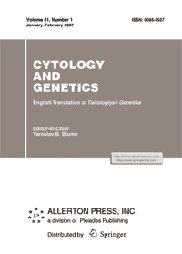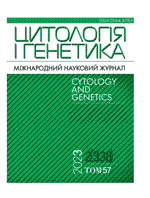SUMMARY. To study the effect of brassinosteroids and salinity stress on the fatty acid metabolism in the seeds of oil plants, we analyzed the turnover of fatty acids in the seeds of Crambe tatarica under the mentioned conditions. The results of gas-liquid chromatography and mass-spectrometry demonstrated the decrease in the level of palmitic and linoleic fatty acids along with the increase in the level of oleic, eicosenoic, and docosenoic fatty acids in C. tatarica seeds in response to 28-homobrassinolide under salinity stress on some stages of seed germination. The found regularities allowed for the assumption that 28-homobrassinolide promotes the stabilization of fatty acid composition of C. tatarica seeds, disrupted under salinity stress. It may indicate the possibility of modulating the activity or expression of desaturase genes and the enzymes of fatty acid oxidation under the effect of brassinosteroids.
Keywords: Crambe tatarica, seeds, fatty acids, salinity stress, brassinosteroids, 28-homobrassinolide

Full text and supplemented materials
Free full text: PDFReferences
Berzuini, S., Zanetti, F., Christou, M., Alexopoulou, E., Krzyżaniak, M., Stolarsk, M.J., Ferioli, F., and Monti, A., Optimization of agricultural practices for crambe in Europe, Ind. Crops Prod., 2021, vol. 171, p. 113880. https://doi.org/10.1016/j.indcrop.2021.113880
Chen, C., Chen, H., Han, C., et al., 24-Epibrassinolide promotes fatty acid accumulation and the expression of related genes in Styrax tonkinensis seeds, Int. J. Mol. Sci., 2022, vol. 23, no. 16, p. 8897. https://doi.org/10.3390/ijms23168897
Chen, C., Chen, H., Han, C., et al., 24-Epibrassinolide and methyl jasmonate promoted seed development of Styrax tonkinensis and affected seed chemical compositions, especially seed lipid metabolism, J. Plant Growth Regul., 2023, vol. 42, no. 4, pp. 2162–2175. https://doi.org/10.1007/s00344-022-10689-z
Costa, E., Almeida, M.F., Alvim-Ferraz, C., et al., The cycle of biodiesel production from Crambe abyssinica in Portugal, Ind. Crops Prod., 2019, vol. 129, pp. 51–58. https://doi.org/10.1016/j.indcrop.2018.11.032
de Vasconcelos, A., Chaves, G.L., Souza, F., Gheyi, H., and Fernandes, J., Salinity effects on development and productivity of crambe (Crambe abyssinica) under greenhouse conditions, Am. J. Plant Sci., 2015, vol. 6, pp. 839–847. https://doi.org/10.4236/ajps.2015.67091
Geilen, K., Heilmann, M., Hillmer, S., et al., WRKY43 regulates polyunsaturated fatty acid content and seed germination under unfavourable growth conditions, Sci. Rep., 2017, vol. 7, no. 1, p. 14235. https://doi.org/10.1038/s41598-017-14695-0
Janeczko, A., Hura, K., Skoczowski, A., et al., Temperature-dependent impact of 24-epibrassinolide on the fatty acid composition and sugar content in winter oilseed rape callus, Acta Physiol. Plant., 2009, vol. 31, pp. 71–79. https://doi.org/10.1007/s11738-008-0202-2
Jankowski, K.J., Sokólski, M., Szatkowski, A., and Kozak, M., Crambe – Energy efficiency of biomass production and mineral fertilization. A case study in Poland, Ind. Crops Prod., 2022, vol. 182, p. 114918. https://doi.org/10.1016/j.indcrop.2022.114918
Kononenko, L.M., Manzii, O.P., Poltoretska, N.M., and Kochovska, I.V., Yield structure of crambe (Crambe abyssinica Hochst.) under the effect of seeding rate and varietal characteristics, Adv. Agritechnol., 2023, vol. 11, no. 1. https://doi.org/10.47414/na.11.1.2023.277054
Li, Y., Beisson, F., Pollard, M., et al., Oil content of Arabidopsis seeds: The influence of seed anatomy, light and plant-to-plant variation, Phytochem., 2006, vol. 67, no. 9, pp. 904–915. https://doi.org/10.1016/j.phytochem.2006.02.015
Liu, N., Chen, J., Wang, T., et al., Overexpression of WAX INDUCER1/SHINE1 gene enhances wax accumulation under osmotic stress and oil synthesis in Brassica napus, Int. J. Mol. Sci., 2019, vol. 20, no. 18, p. 4435. https://doi.org/10.3390/ijms20184435
Martins, L., Costa, F., Lopes, J., et al., Influence of pre-germination treatments and temperature on the germination of crambe seeds (Crambe abyssinica Hochst), Idesia (Arica), 2012, vol. 30, no. 3, pp. 23–28. https://doi.org/10.4067/S0718-34292012000300003
Pavel, P., Přemysl, Š., Pazderů, K., et al., Effects of biologically active substances used in soybean seed treatment on oil, protein and fibre content of harvested seeds, Plant Soil Environ., 2017, vol. 63, no. 12, pp. 564–568. https://doi.org/10.17221/702/2017-PSE
Pushkarova, N. and Yemets, A., Biotechnological approach for improvement of Crambe species as valuable oilseed plants for industrial purposes, RSC Adv., 2022, vol. 12, no. 12, pp. 7168–7178. https://doi.org/10.1039/d2ra00422d
Pushkarova, N.O., Kalista, M.S., Kharkhota, M.A., et al., Crambe tataria sebeók seeds and plants grown in vitro and in vivo fatty acid composition comparison, Potravinarstvo, 2016, vol. 10, no. 1, pp. 494–498. https://doi.org/10.5219/646:10.5219/646
Righini, D., Zanetti, F., and Monti, A., The bio-based economy can serve as the springboard for camelina and crambe to quit the limbo, OCL, 2016, vol. 23, no. 5, p. D504. https://doi.org/10.1051/ocl/2016021
Rudloff, E. and Wang, Y., Crambe, in Wild Crop Relatives: Genomic and Breeding Resources, Kole, C., Eds., Berlin: Springer-Verlag, 2011. https://doi.org/10.1007/978-3-642-14871-2_5
Sahni, S., Prasad, B.D., Liu, Q., et al., Overexpression of the brassinosteroid biosynthetic gene DWF4 in Brassica napus simultaneously increases seed yield and stress tolerance, Sci. Rep., 2016, vol. 6, p. 28298. https://doi.org/10.1038/srep28298
Samarappuli, D., Zanetti, F., Berzuini, S., and Berti, M.T., Crambe (Crambe abyssinica Hochst). A non-food oilseed crop with great potential: A review, Agronomy, 2020, vol. 10, no. 9, p. 1380. https://doi.org/10.3390/agronomy10091380
Silva, M.F., Araújo, E.F., Silva, L.J., et al., Tolerance of crambe (Crambe abyssinica Hochst) to salinity and water stress during seed germination and initial seedling growth, Ciência Agrotecnologia, 2019, vol. 43, no. 1, pp. 1–13. https://doi.org/10.1590/1413-7054201943025418
Urrestarazu, M., Gallegos-Cedillo, V.M., Ferrón-Carrillo, F., Guil-Guerrero, J.L., Lao, M.T., and Álvaro, J.E., Effects of the electrical conductivity of a soilless culture system on gamma linolenic acid levels in borage seed oil, PLoS One, 2019, vol. 14, no. 2, p. e0207106. https://doi.org/10.1371/journal.pone.0207106
Xiao, R., Zou, Y., Guo, X., et al., Fatty acid desaturases (FADs) modulate multiple lipid metabolism pathways to improve plant resistance, Mol. Biol. Rep., 2022, vol. 49, no. 10, pp. 9997–10011. https://doi.org/10.1007/s11033-022-07568-x
Yang, Y., Kong, Q., Lim, A.R.Q., et al., Transcriptional regulation of oil biosynthesis in seed plants: Current understanding, applications, and perspectives, Plant Commun., 2022, vol. 3, no. 5, p. 100328. https://doi.org/10.1016/j.xplc.2022.100328
Yao, T., Xie, R., Zhou, C., et al., Roles of brossinosteroids signaling in biotic and abiotic stresses, J. Agric. Food Chem., 2023, vol. 71, no. 21, pp. 7947–7960. https://doi.org/10.1021/acs.jafc.2c07493
You, Z., Zhang, Q., Peng, Z., et al., Lipid droplets mediate salt stress tolerance in Parachlorella kessleri, Plant Physiol., 2019, vol. 181, no. 2, pp. 510–526. https://doi.org/10.1104/pp.19.00666
Yuan, S.-W., Wu, X.-L., Liu, Z.-H., et al., Abiotic stresses and phytohormones regulate expression of FAD2 gene in Arabidopsis thaliana, J. Integr. Agric., 2012, vol. 11, no. 1, pp. 62–72. https://doi.org/10.1016/S1671-2927(12)60783-4
Zhang, Z., Luo, Y., Wang, X., et al., Fruit spray of 24-epibrassinolide and fruit shade alter pericarp photosynthesis activity and seed lipid accumulation in Styrax tonkinensis, J. Plant Growth Regul., 2018, vol. 37, no. 4, pp. 1066–1084. https://doi.org/10.1007/s00344-017-9769-4
